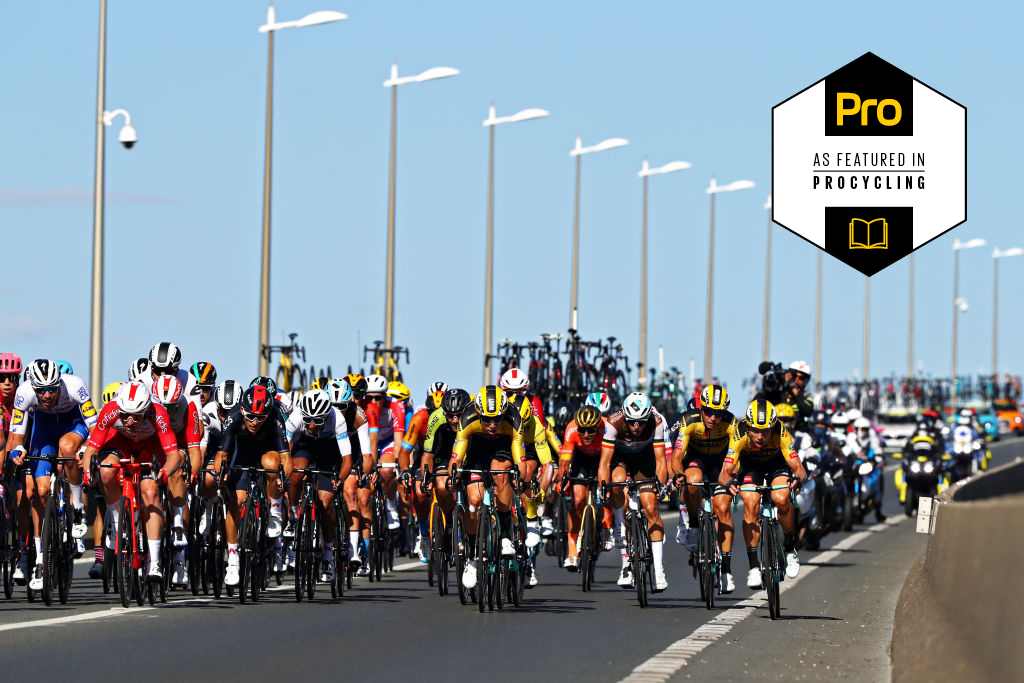Tour de France stage 10 analysis: Under pressure
The 2020 Tour de France has been described as one of the most stressful ever for riders

Stress hung in the air like salt on the sea breeze all the way through stage 10 of the 2020 Tour de France. The results sheet will show that Sam Bennett beat Caleb Ewan and Peter Sagan in a bunch kick on the Île de Ré, and no doubt in future years, fans may look at the result and assume that this had been a straightforward flat stage, some welcome relief between mountain ranges, a day for a long, harmless break and a sprint.
That went out of the window almost immediately. A textbook-looking two-up break with Michael Schär and Stefan Küng went away… and came back within an hour. There was no chase - teams trying to keep themselves and their leaders out of trouble just ended up riding so fast that the Swiss duo were caught - no mean feat, given the time trialling strength of both men.
Road furniture, narrow roads and the weather combined to make it a stressful race from start to finish. Crashes and crosswinds split the bunch up, again and again. Each time the bunch reformed, there was more blood, shredded race kit and unhappy looking riders.
It was hard to watch. In his post-stage comments for Eurosport, Bernhard Eisel asked the viewers if they’d enjoyed it. “I’m not a big fan of this year’s Tour,” he said.
"It was the rest day yesterday and today it was straight into another stressful day. It’s been stressful every single stage we have watched so far. It was a bunch sprint, but for me, all that stress getting to the line is too much for the riders.”
Stress is everywhere at the Tour. Ask a rider any time to explain what marks this race out from the others, and he’ll tell you two things. The Tour de France is bigger than any other race. And it’s more stressful.
The stress comes in all shapes and sizes, and it affects everybody. Pressure from fans, media, sponsors and their own expectations squeezes the riders slowly. Contract year? Stress. Sprinter without a win yet? Stress. Lead-out rider? Stress. Starting to get tired? Stress. Maybe you’ve won the green jersey seven times, but the eighth has not been coming so easily. Stress. It’s not just the riders - managers face exactly the same pressures, with the added stress that their decisions and orders are acted out by proxy.
Get The Leadout Newsletter
The latest race content, interviews, features, reviews and expert buying guides, direct to your inbox!
Maybe a couple of riders aren’t getting on well on the team, or you have two GC riders but they didn’t get enough help from the bigger guys on the crosswind stage - that’s all stress. The race organisers are, of course, under pressure and any race is a continual process of near misses and potentially dangerous circumstances. And there’s no need to explain stress to the journalists following the Tour - we eat it up, digest it and turn it into content, by 8pm 9pm every day.
When a person feels threatened, the nervous system responds by flooding the body with stress hormones. Adrenaline and cortisol speed up the heart rate; senses are on edge; focus is sharp. The immediate effect can be beneficial - the body is being prepared for fight or flight. The trouble with being a Tour de France rider is that they are in a permanent state of both fight and flight. Acute stress gets you out of tight situations, but chronic stress just wears you down.
The 2020 Tour peloton looks worn down already, and we’re only halfway through the race. The stress has been baked into the route by organisers ASO, who are building in fewer and fewer quiet days or straightforward sprint days in their flagship event. It’s only a little more than a decade since the Tour routinely started with seven or more flat days. However, the 2020 route looks more like an obstacle course than any previous edition of the race, with mountains on days two, four, six, eight and nine. In between, the wind has wrought havoc. And the Tour got off to an inauspicious start with rain mixing with months’ worth of diesel, petrol and brake pad powder to turn the roads into a virtual ice rink on the very first day.
Of course, ASO cannot control the weather, even if they knew that stage 10 would more than likely be exposed to the wind. And the Tour needs its excitement levels to be high. However, put a nervous, stressed peloton on narrow roads with dozens of roundabouts and pieces of road furniture to negotiate, and crashes are likely.
At the end of the stage, the television pictures showed the victorious Sam Bennett in the embrace of his teammates, all smiles, the pressure momentarily lifted. For one rider at least, the stress had completely disappeared. For everybody else, the prospect of another stressful day tomorrow.
As part of our autumn sale a subscription to Procycling magazine currently costs £5 for the first five issues (UK offer only) – that's only £1 per issue.
Edward Pickering is Procycling magazine's editor. He graduated in French and Art History from Leeds University and spent three years teaching English in Japan before returning to do a postgraduate diploma in magazine journalism at Harlow College, Essex. He did a two-week internship at Cycling Weekly in late 2001 and didn't leave until 11 years later, by which time he was Cycle Sport magazine's deputy editor. After two years as a freelance writer, he joined Procycling as editor in 2015. He is the author of The Race Against Time, The Yellow Jersey Club and Ronde, and he spends his spare time running, playing the piano and playing taiko drums.